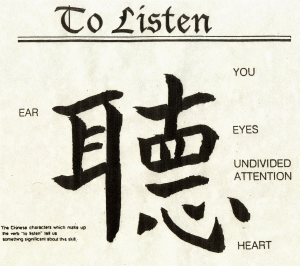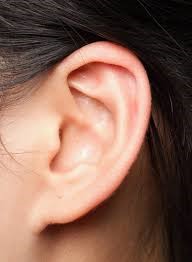 It’s well recognized that the capacity to innovate is a function of active listening and is often compromised by chronic job and life stressors and energy traps.
It’s well recognized that the capacity to innovate is a function of active listening and is often compromised by chronic job and life stressors and energy traps.
Your ability to listen and actually hear is influenced internally, by what you are feeling and what you are thinking and externally, by stimuli that distracts you. Active listening then is a mental discipline, a skill you can develop with training, coaching and practice.
Good listening skills means hearing what someone else is saying, and help you tune into your own thoughts and feelings to assess how you’re receiving the perceived message. By listening you learn to assess what you think you heard against what your body’s feeling state perceived in an efficient and meaningful way. Learning to read the language of the body and understand it correctly is a perceptual ability that can be cultivated. It requires mindful attention to what is being experienced in the moment.
“It’s a mistake to think we listen only with our ears. It’s much more important to listen with the mind, the eyes, the body, and the heart. Unless you truly want to understand the other person, you’ll never be able to listen.” Mark Herndon
Our ears, not only let us hear, they also:
- Control balance
- Help coordinate body movement
- Permit language

- Allow us to speak eloquently and
- Sing in tune.
When our head and body move, the labyrinth of the inner ear moves too with the inner vestibular fluid that facilitates balance and orientation following at a different pace. The difference in speed of the movement of body and the fluid stimulates the sensory cells resulting in neural impulses sent to the vestibular nerve which carries the message to the brain. Vestibular sensations record body positions and movements permitting their control. The energy we receive from body movement is vestibular energy.
Cultivating the skill of inner listening helps to harmonize our body, mind, soul and spirit to act as one.
Sound as Nourishment
 The sounds and movements we experience are food for our nervous systems, providing almost 90% of our sensory energy needs. Listening requires the ability and the desire to use our ears. We tune in and tune out at will – we choose to actively listen. Listening takes heed of the Self. It energizes us and brings about harmony within us and in our relationship with others and our world.
The sounds and movements we experience are food for our nervous systems, providing almost 90% of our sensory energy needs. Listening requires the ability and the desire to use our ears. We tune in and tune out at will – we choose to actively listen. Listening takes heed of the Self. It energizes us and brings about harmony within us and in our relationship with others and our world.
The practice of listening to your own inner voice or listening to another can have the same powerful healing effect. Listening actively helps us understand our emotions and learn to acknowledge and recognize the feelings of others.
Active listening helps us:
- stay centered and grounded,
- present in the here and now,
- energized and ready to act.
Listening affirms and validates that which has been heard, and as such it is the cornerstone to developing awareness, emotional intelligence and enhanced coping skills.





